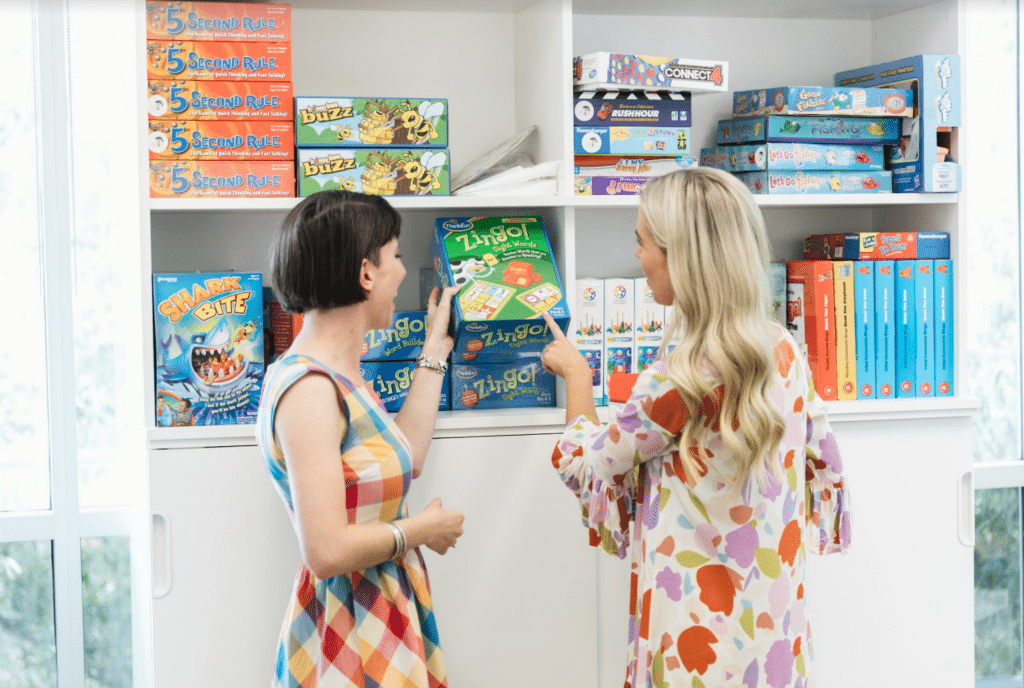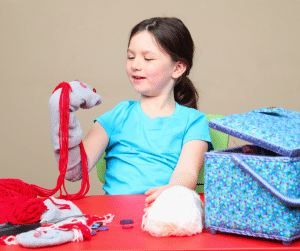Ever find yourself sitting in a therapy session thinking, “Is my Pop Speechie doing therapy, or did we just come here to play games?”.
A common misconception surrounds Speechies delivering therapy through play. After all, at first glance it looks easy enough, right?
Surprisingly, there’s a fair bit of strategy that goes on behind-the-scenes of ‘just playing games’ in a Speech Therapy session!
A child’s primary occupation is play. Through play they are able to learn new skills in communication, social interactions, gross and fine motor skills and more.
Today, we’ll explain what play-based therapy is, the skills children learn through play-based interventions, and how YOU can practice play-based therapy with your child at home to strengthen their communication skills.
Joining in and playing like a child can be done everyday, anytime, anywhere! When you join in and play, you meet your child at their level and tune into their messages.
Information in this blog post was inspired by Teach Me To Talk and The SLT Scrapbook.
A common misconception surrounds Speechies delivering therapy through play. After all, at first glance it looks easy enough, right?
Surprisingly, there’s a fair bit of strategy that goes on behind-the-scenes of ‘just playing games’ in a Speech Therapy session!
A child’s primary occupation is play. Through play they are able to learn new skills in communication, social interactions, gross and fine motor skills and more.
Today, we’ll explain what play-based therapy is, the skills children learn through play-based interventions, and how YOU can practice play-based therapy with your child at home to strengthen their communication skills.
What is play-based therapy?
Play-based intervention is defined as “practices designed to improve socio-emotional, physical, language, and cognitive development through guided interactive play” (WWC, 2012).What kind of skills can my child learn?
Play-based learning is a natural approach to learning for children to facilitate early language skills including:- Joint/Shared Attention – This occurs when two people have a shared focus on the same stimulus e.g. the same toy, book, food. This skill entails the ability to gain, maintain, and shift attention. A critical skill for language development, it is essential for children to be able to initiate and respond to others initiating joint attention.
- Imitation – Imitating involves intentionally copying a gesture, action, or behaviour as if mirroring the other person. Imitation skills can start as early as infancy and continue to develop as foundational blocks to verbal language.
- Gestures – Gestures are considered to be pre-cursors to language development, and are a crucial way for children to communicate before they have developed their verbal language skills; simply, they are a great way for the child to get their message across and show you that they have understood what you have said. Gestures can include things like pointing, raising their arms to request to be picked up, clapping, blowing a kiss, pointing, shaking their head ‘no’, and so on.
- Encourage vocalisations and vocabulary development – This can be done through language stimulation techniques such as OWLing whilst engaging in play. Check out our blog post on OWLing here.
- Turn-taking – Turn-taking is an essential play skill that we not only use in our physical interactions with games and toys, but also as our language begins to build and we learn to take-turns within a conversation. Games that require multiple players are great, but you can also turn any interaction into one that requires taking turns, it can be as simple as rolling a ball to each other, or pulling a silly face at one another.
Why are these skills so important?
Early language and vocabulary development relies on foundational skills like those listed above. Without these skills, children may have difficulty developing higher level skills such as communicating verbally.How Can I Practice Play-Based Therapy At Home?
- “People” games such as tickles, chase, horsie rides, “ring around the rosie” or hide and seek.
- Copying/imitating actions with objects, whole body movements, facial expressions, or gestures. For example, shaking a toy, clapping hands, poking out your tongue, waving.
- Games played on the hands and feet such as “this little piggy”, “pat-a-cake” or “round and round the garden”.
- If your child enjoys jumping, you can make a game or song while the child jumps on the bed or a trampoline (or even use an old-fashioned nursery rhyme!).
- If your child is hesitant to start an interaction, you could get your own toys and watch their reaction, or follow and imitate them (eg. if they are dancing to The Wiggles on TV, you can start dancing too!).
Joining in and playing like a child can be done everyday, anytime, anywhere! When you join in and play, you meet your child at their level and tune into their messages.
Information in this blog post was inspired by Teach Me To Talk and The SLT Scrapbook.






